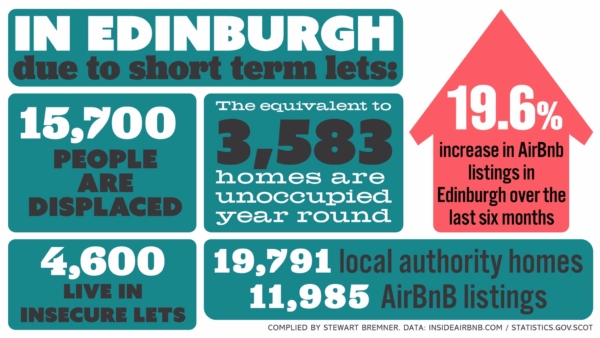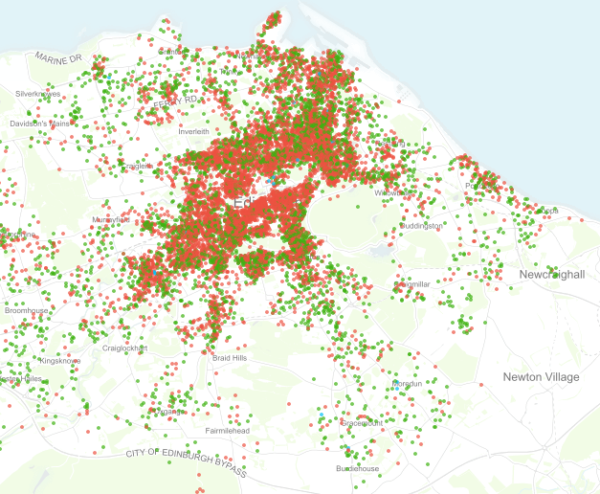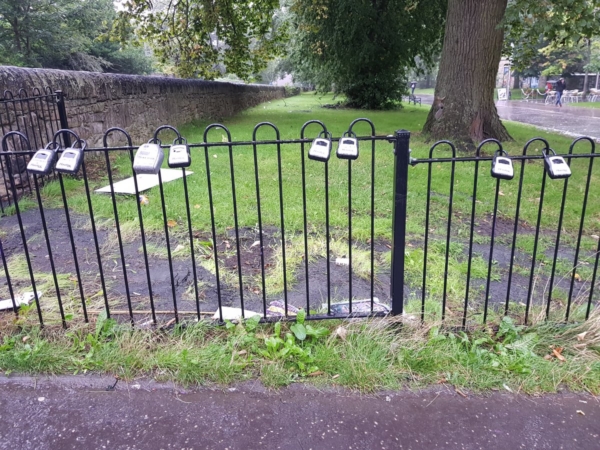1:48 is the new 7: 84


Behind the froth and foam of the Brexit pantomime lies serious social decay. The search for Blue Passports has overshadowed problems in food poverty with a new report out this week suggesting the use of food banks in Scotland was twice previous estimates. At a UK level it was revealed that almost four million children don’t have enough money for a healthy diet. The growing crisis of poor nutrition, childhood-obesity and hunger has been crowded-out by the constitutional malaise but it’s not going away anywhere however much people shout “traitor” and yearn for chlorinated chicken.


The annual UK Housing Review, shows that in the City of Edinburgh alone there are over 10,000 Airbnbs. With a population of 485,000, that means there is an Airbnb for every 48 people in the city.
That compares to a figure of one Airbnb per 105 people in greater London, meaning Scotland’s capital has more than twice as many per head.
1:48 is the new 7: 84.
The phenomenon is not confined to Edinburgh but grows like a rash across Scotland exacerbating the housing crisis in urban and rural Scotland too.
What started as hopeful innovation of the sharing economy has descended into community-destroying farce. Although there are attempts to create a retrospective regulatory framework and to clamp-down on actual illegal activities. it does feel like its working against the tide.
Property owners who already own a second or third or fourth property are raking it in, as are property developers and a pox of associated companies and support agencies ‘Air BnB Clean’ etc.
The Chartered Institute of Housing identified three specific impacts of growth of short-term lets in Edinburgh:
- Impact on local housing markets both with respect to rising rents and increased property values, especially in small local areas, such as Edinburgh’s New Town.
- A loss of neighbourhood amenity, since it is often not just homes; but entire neighbourhoods which are used for short-term lets.
- A lack of future development as many landlords of short-term lets will not comply with council planning.
The massive growth of Edinburgh as a tourist destination is part of a strategic plan, not some accident of nature. The unquestioning worship of the growth economy, has created a monster that everyone from city councils to “business leaders” to universities and governments takes part in, even when the evidence is that it is destroying our social fabric and our ecology.
Cities like Edinburgh have become commodified hollowed-out shells set aside for tourists and the plan is for more much more. As councils outsource and sell-off amenities, common good land and whole areas, the city is privatised.
The result is that residents are pushed to the margins, both physically and culturally whilst the centre swells with lucrative but increasingly disoriented visitors imbibing a tourist experience gravely diluted by inauthenticity.
Everywhere becomes to look like everywhere else.
In 2018 the anarchist David Graeber created the idea of Bullshit Jobs a theory that over half of societal work is completely pointless, which becomes psychologically destructive when paired with a work ethic that associates work with self-worth. To this we could add Bullshit Travel, in which people fly on low-budget airlines to have a poor-quality and essentially meaningless cultural experience, interacting only with other Bullshit Travellers.
This is essentially the outcome of massive Overtourism, which unfortunately is serenaded high and low by the Scottish Government. To condemn it is akin to treason and yet the combination of the commitment to endless growth and to relentless drives for more and more tourists and Bullshit Travellers is causing social misery, huge ecological damage and undermining an already fatally unjust housing system.
What can be done?
Probably nothing. We could talk about tourism and we could talk about growth, but these things are so hard-wired into our economy as an unquestionable good that won’t happen soon. Unless people begin to look about at what’s happening and begin to organise serious resistance and structural change.
In Berlin this is already happening. Support is growing for a referendum on whether to ban large landlords from the German capital and turn their property into social housing stock. The proposed referendum, which could take place as soon as the middle of 2020 would set a legal precedent in establishing housing as a human right. The campaign is named Expropriate Deutsche Wohnen & Co after the city’s largest private landlord, is widely popular.
The idea of reclaiming or “expropriate” housing stock owned by large private companies is one way forward. So is a proper ambitious zero-carbon public-house-building and re-building programme, along with strict rent controls and regulation.
To achieve this we need a revolution in urban thinking, an overthrow of the developers and landlords and their enablers and a renewal of the very concept of citizenship. We need to stop worshipping growth and start attending to the socio-ecological crisis it has created.
*
Featured graphic by Stewart Bremner


I have lived in the west end of Glasgow for more than 40 years. Because of the University, and the BBC as well as a pleasant ambience this area always had a letting market, much greater than the rest of the city. However, the permanent population was hugely greater and this fostered a sense of community. Most residents were owner occupiers and, for many, this was their first venture into property owning and, it was principally considered as a place to live and raise children, rather than an ‘asset’. A fair number used their first purchase as a first step on the ‘property ladder’, with the steps on the ‘ladder’ being more capacious properties and/or ones which were in better structural condition. But, they were still essentially ‘homes’ in the sense of ‘settlement’.
But, with the infamous sale of Council housing, the control this effected on property prices was removed. Revenues from sales of Council housing were forbidden from being invested in building new housing stock and so a housing shortage developed, property prices soared – my wife’s and my flat is now ‘worth’ more than 50 times what we paid for it. – and a renting market developed.
In the immediate vicinity of our flat, for most of the past 40 years, almost all were owner occupied, with most of the rest being long term rentals. A few were multioccupancy for students and other young workers. Now, a significant minority are multiple occupancy or short term AirBnB type lets. A block built about 15 years ago is entirely short term lets despite the fact that at the time of construction, consent was for family flats. A fair number of the historic family houses and flatas are now rented out short term, by people who grew up in these properties and inherited them when their parents died.
The ethos of the area has changed. There is a neglect of ‘common responsibilities’ for maintaining roofs, gables, closes, stairs, back courts. Rubbish accumulates because short term residents simply dump it or, more usually the ‘cowboys’ who get cash in hand for clearing out properties between lets just fly tip furniture, etc in access lanes. Parking dominates the streetscape and access lanes are usually blocked by parked cars, preventing access for rubbish uplift and for emergency vehicles. There have been occasions when people pushing proms could not cross roads because of the density of parking.
Glasgow City Council is attempting to deal with this but, legally and politically, it is a sair fecht. Gradually, I think that a more organised resistance is emerging.
This is a problem that has to be dealt with before we destroy the things that make our cities the places they are. AirBnBs bring very little income to local economies. Things like Tourist taxes are but a first step. We need more, especially, Council housing and rent controls. We need land reform and taxation to bring gap sites into use again.
If nothing can be done at the moment very quickly, perhaps everything that could be done on a basis of what is available .
Do these properties have permission for multiple lets,? Do they meet fire regulations? If they are businesses are they registered as such? Are proper tax returns being produced?Are they insured proprly? To name but a few. Are they being advertised legally within trades descriptions? Perhaps Councils could actually try and squeeze these buy to letters for some return and legally come down on them when rules and permissions are ignored.
Richard Easson, these are fair points to raise, particularly in regard of houses of multiple occupancy (HMO), but also are applicable to some extent to AirBnB type lettings HMOs require to be formally licensed by the local authority Licensing Committee. They are also required to get planning consent from the separate Planning Committee. These two committees do not liaise and Licensing Committees rarely require that there is Planning consent before granting a licences.
It is, I think too facile to impute incompetence, corruption, etc to committee members who are required to conduct themselves in a quasi-judicial manner. The members rely heavily on the advice of Council officers and legal services and the arcane nature of the legal situation is pretty opaque to me and, I suspect to committee members who are, essentially, lay persons, but empowered to grant licenses.
If existing licences come up for renewal, these are generally rubber stamped and renewed, partly because, even though the legal requirements might have changed the renewal is based on the legal situation when the license was first granted. There might well be an inspection by a Council Officer, but this is fairly basic. In addition, Councils no longer have the staff to check the increasing number of premises adequately. This is due to ‘austerity’ and austerity is in reality a transfer of wealth and power from the majority of us to the small, very wealthy and increasingly empowered financial and landowning clique. These people have had their agents in Westminster, Whitehall and in the legal establishment couch property laws to suit themselves.
This is why we need to support the Scottish Government in Land Reform and, indeed, encourage it to be bolder. The Greens and Labour support land reform, so there is a very large majority at Holyrood and likely to be so for the foreseeable future, unless Westminster changes the law, as it did when overriding the decision by Holyrood with regard to Brexit. Mr Andy Wightman, our best informed MSP with regard to land law is currently being pursued through the courts by Scottish landowners. The covert intention is to bankrupt him and so disqualify him as an MSP. These people have powers and are not inhibited about using them with extreme nastiness. Mr David Cameron’s father in law is a big wheel amongst Scottish landowners, so, if Holyrood does begin to exert itself, the law could well be changed and changed quickly. In any case, as in the ‘power grab, Westminster just grabbed powers which by law lie at Holyrood and HMG, applauded by the media, gave Holyrood and Cardiff (and, presumably, Belfast,) two fingers.
What the Brexit pantomime has shown is the rickety, gimcrack natureof the ‘unwritten constitution’ of the UK. The UK is falling apart, but we need enough Scots to support independence so that we can manage this collapse and extricate ourselves. However, many NO voters are small property owners and, no matter what a bourach Westminster is making of things, many see it as the protector of their way of life.
Many are fairly sanguine about the commodification of Edinburgh in the way Mr Small eloquently describes.
As I indicated in my first post, my wife and I own an ‘asset’ worth more than 50 times what we paid for it. But we own no other proerty. This is our home. If we ‘realise’ this ‘asset’, we will have to find somewhere else to live and that will swallow up almost all of what we ‘realised’. For the vast majority of us, property owning is an illusion. We can pass it on as an asset to our family. I think we have transmitted a morality which would prevent the ‘asset’ being used for rentier purposes. However, what we really need are changes which end this ponzu scheme of property and the associated debt. I think very many people, as we do, like to own our own home, but it is our home, not a commodity. I believe in increased and progressive taxation for ownership of more than one residence.
Perhaps Nicola S has a special interest in this urban problem. Her Govanhill constituency holds some of the city`s worst slums, occupied -and often owned or rented out – by ethnic minorities. The city council is pouring effort and taxpayers money into trying to stem the mess. (and failing). Meanwhile the SNP want to encourage more foreign born newcomers into the country and the council accepts Westminster money to accept more and more “asylum seekers” for housing. Can the politicians explain?
Dead simple RB Robertson .
The Conservative Party want to reduce child birth in the indigenous population.
And they do it by reducing financial support to hardworking families if they have over two children
They do it also through austerity and a low wage economy which puts a brake on the decision to have children.
And they do it through the policy of asset bubbling the prices through selling council homes and choking new build supply.
Great for the banks who nearly went bust because of asset Bublé lending, but not so great for folks choking to pay a mortgage, or worse still, rent a home in the private renting sector.
We’re it not for immigration and let us not conflate racistly ‘ asylum seekers’ Scotland population would be in decline.
But you know that WBR and you just come on to troll. Keep the puff !
Smashing post. I am presenting to a room full of event organizers tomorrow in Copenhagen. It’s about sustainability asking them to question the impact their events have on the communities who “host them” Words have given me an extra spark!
Valid points.
However, perhaps a Before the Storm series could look elsewhere at similar considerations around the globe which described ordinary people’s future planning before hit by bombings, tsumanis, tornadoes and environmental poisonings that put all this in context and try to achieve some global solidarity. For the purpose of global and local solutions.
A worldwide “what people were hoping for their kids’ futures and what screwed it up” theme might link such articles together and be more effective in opposing worldwide phenomenon/contagions like Airbnb.
A well thought through piece. It has a gap in the middle – people who need accommodation are rightly choosing AirBnB rather than inflated rental priced lets, as we have a lot of poor folk, and low income situations, after a time of Tory austerity. So, we have a social need, which AirBnB is helping with. Edinburgh, of course, and its particular tourist magnetism, is atypical of the national situation, and I like the analysis here. The article overtly begs the question – how to get beyond a growth economy in a nation which is paying lip service to its “Growth Commission”. The economics of sustainability, environmental harmony, and wellbeing without a frenetic energy-driven lifestyle is the target, and social commentary aside, who are the courageous thinkers and adventurers who will put together this new Scotland?
Re Willie…I don`t normally rise to the bait. However, if as you argue, housing needs in Scotland are aggravated by a WM Govt pursuing austerity and a “low wage economy ” then will encouraging more poor people from ethnic communities into Govanhill/Scotland tend to increase wages?. Or will it help employers to keep wages low?
Bullshit Travel. Spot on Mike.
One thing… oh how the (probably former) residents of various European and other holiday hotspots must look on and shrug. The truth is though, these economies probably did welcome the tourism boom ourselves and the English gave them. In true Scottish style we are already not coping with the amounts we have every year now(see Skye, Edinburgh, Harris is getting there) but still greedily pulling as many more we can in without any thought for the environment, public services or taxation. Growth is the new undercover name for greed.
Whilst the state continues to underwrite the behavour of commercial banks it will continue.